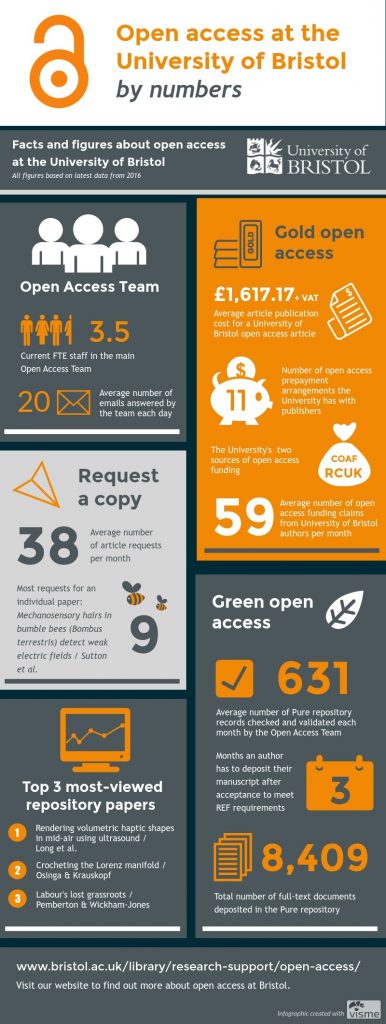Today’s blog post comes from Tim Riley, Open Access Senior Supervisor at the University of Bristol

Like many institutions up and down the UK, Bristol has an Open Access Team. We’re a small team of staff based within Library Services, but you’re unlikely to see us out and about in the campus libraries: we work ‘behind the scenes’, supporting authors to make their research outputs (journal articles, conference papers, books chapters, and more) open access.
Our work not only helps authors to make their research available to a much wider global audience but also enables them to meet HEFCE and other funder requirements on open access.
We support two main processes:
- ‘Green’ open access – where authors archive a version of their paper in Pure, our institutional repository.
- ‘Gold’ open access – where articles are made open access in journals themselves, usually on payment of a fee to the publisher, known as an article processing charge (APC).
See the infographic for some key facts and figures about the team and our work in these two areas.
Validation, validation, validation – supporting green open access
A large part of the work we do consists of validating records for research outputs that authors have uploaded to Pure. Validation is essentially a checking process where we make sure that the information in the records is accurate and, just as importantly, that the documents we’re making available to the public via the repository are the correct version and do not infringe any copyright restrictions. Most publishers place restrictions on the version of a research output that can be made available via a repository, and they usually specify an embargo period during which we’re not allowed to make the deposited document public too.
The validation process can be complex and time-consuming but always needs to be done accurately. Having a team of specialist staff to do this removes some of the headache for authors and makes it easier for the University to stay the right side of the copyright lawyers!
As well as navigating the copyright requirements stipulated by publishers, we also help authors to meet the requirements of major funders such as HEFCE, RCUK and the COAF partner medical charities. By timely checking of the versions of documents which authors upload, and making sure documents remain embargoed for only as long as is absolutely necessary, we can help ensure that authors are meeting their REF and funder requirements within the restrictions set by their publishers.
Going for gold – payments for gold open access
The second main activity our team supports is ‘gold’ open access. Some major research funders, namely RCUK and the medical charities in COAF, have awarded the university funds in the form of block grants which can be spent on open access publication charges in eligible journals. At its simplest, eligible authors request funding via our team, and we pay the publisher on the author’s behalf using the appropriate block grant money. This sounds straightforward enough, but in practice this process can become rather Byzantine as there may be many additional layers of complexity.
Before any payment can be made, we check and advise authors whether their papers are actually eligible for funding. We also have to check that the journals which authors wish to publish in meet the open access criteria for their funders. We report back to our funders on a regular basis and we need to show that we’re spending their money appropriately on papers which meet all their conditions.
When it comes to payment, we have entered into deals with a number of publishers which give APC discounts – but only to certain authors, with certain funders and in certain journals. Members of our team will run through the various permutations and select the most cost-effective payment method permissible for each paper. And although the vast majority of payments are straightforward, we spend a fair bit of time unravelling things when the payment and publication process hasn’t gone quite as smoothly as was planned for one reason or another.
Even after payment has been made, our work is not over. In a significant number of cases, articles are published under incorrect reuse licences or without the correct funder acknowledgements. There can also be issues around the mandatory deposit of papers with medical funding in the medical subject database Europe PubMed Central. We check every article which we have paid for once it has been published, and chase errant publishers where we spot any of these publication problems. This is another key part of keeping our funders happy and showing them that they’re getting value for money for the block grants they award to Bristol.
Request a copy – connecting authors and external researchers
We also mediate a ‘request a copy’ service for papers which are held in our repository but are not yet publicly available. This service enables us to put external requesters who are interested in these papers in contact with the Bristol authors. These requesters have included people working for government agencies, policy makers, charities and NGOs – people who don’t have subscription access to the original published articles but who still need access to Bristol research for their own work and research.
Collaboration with colleagues in the institution and beyond
As might be expected, the UK open access community is very open and collaborative. As a team, we not only work closely with other teams in the University, such as the Research Enterprise Development (RED) team, but we also engage with colleagues at other institutions in our region and more broadly across the country via discussion lists, social media and various meetings, events and conferences. In such a fast-changing field, it really pays to keep up to speed with the latest developments and tap into the collective wisdom of colleagues across the country for the vexing and thorny issues of the day.
Working together, we have negotiated improvements for future upgrades to our repository system, put pressure on recalcitrant publishers and shared solutions to all manner of shared problems. Plus, it’s always nice to have a day away from the office to meet like-minded people, even if you are discussing technical repository requirements for REF compliance!
Further information
You can find further information about open access at the University of Bristol via our webpages: http://www.bristol.ac.uk/library/research-support/open-access/
You can also contact the team directly: open-access@bristol.ac.uk
Tim Riley
Open Access Senior Supervisor, University of Bristol

 Open access publishing is an established and familiar part of academia, but other aspects of open science are less widely appreciated. Open science is an umbrella term describing efforts to make various aspects of the scientific research process accessible to anybody. This can include publications (i.e., the open access part of open science), but also study materials (open materials) and data (open data). The Facilitate Open Science Training for European Research (FOSTER) project has developed a full
Open access publishing is an established and familiar part of academia, but other aspects of open science are less widely appreciated. Open science is an umbrella term describing efforts to make various aspects of the scientific research process accessible to anybody. This can include publications (i.e., the open access part of open science), but also study materials (open materials) and data (open data). The Facilitate Open Science Training for European Research (FOSTER) project has developed a full